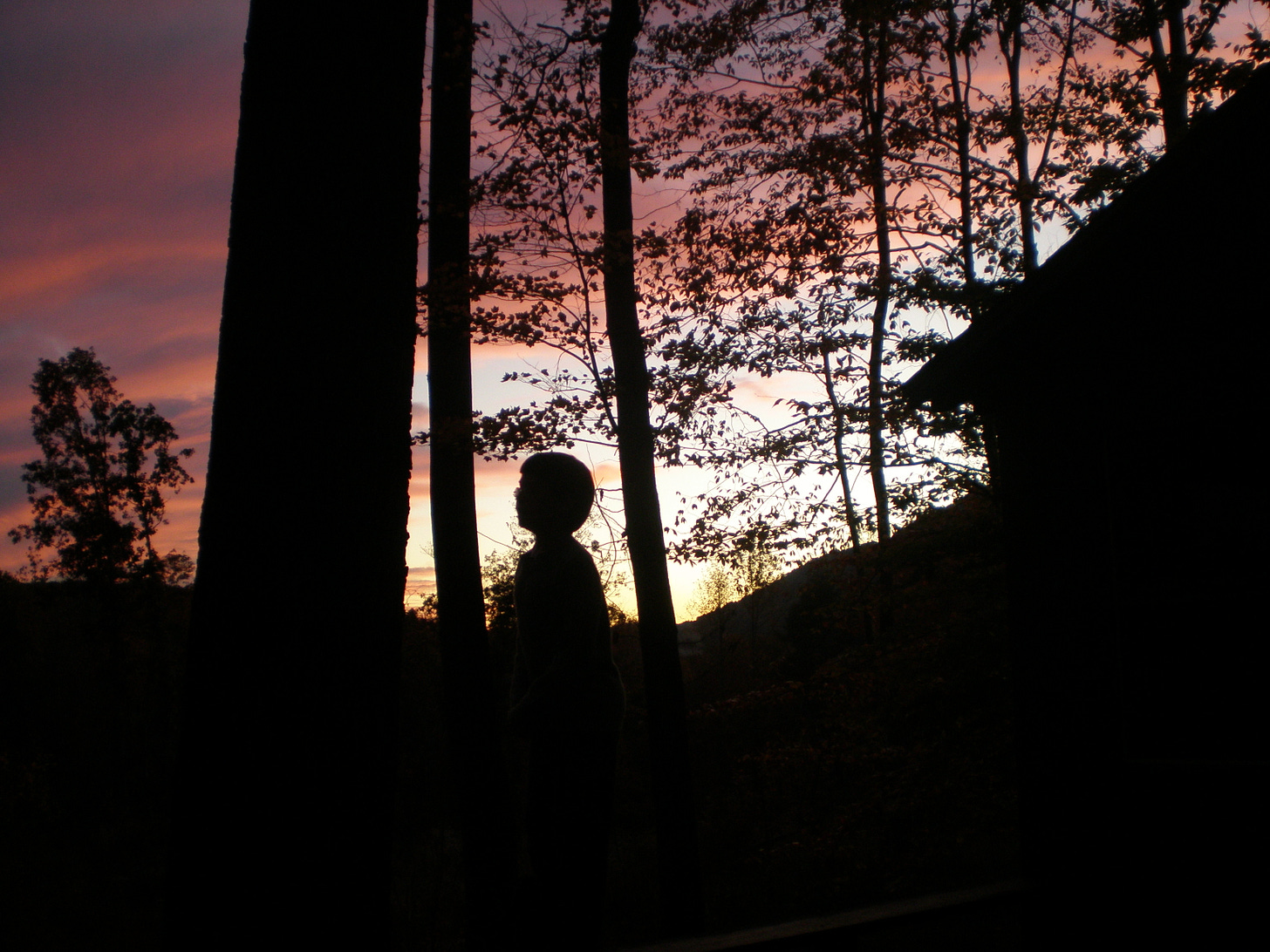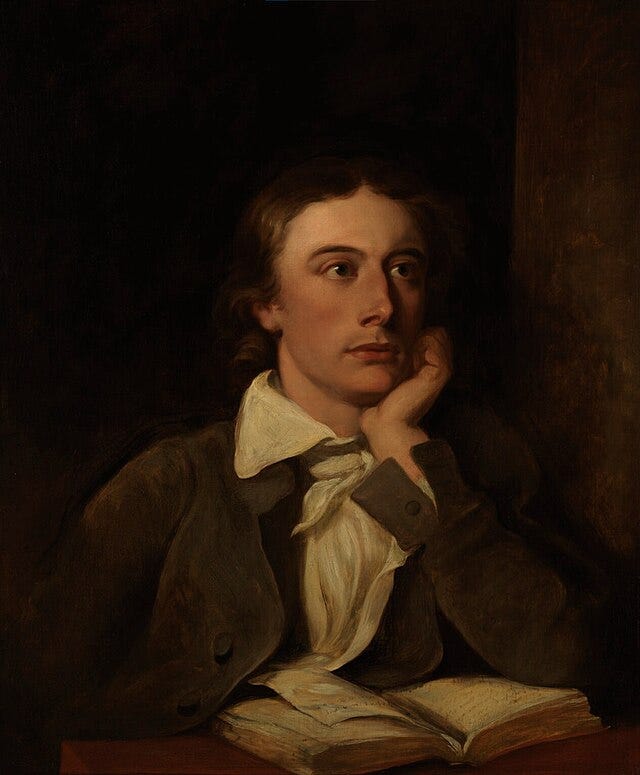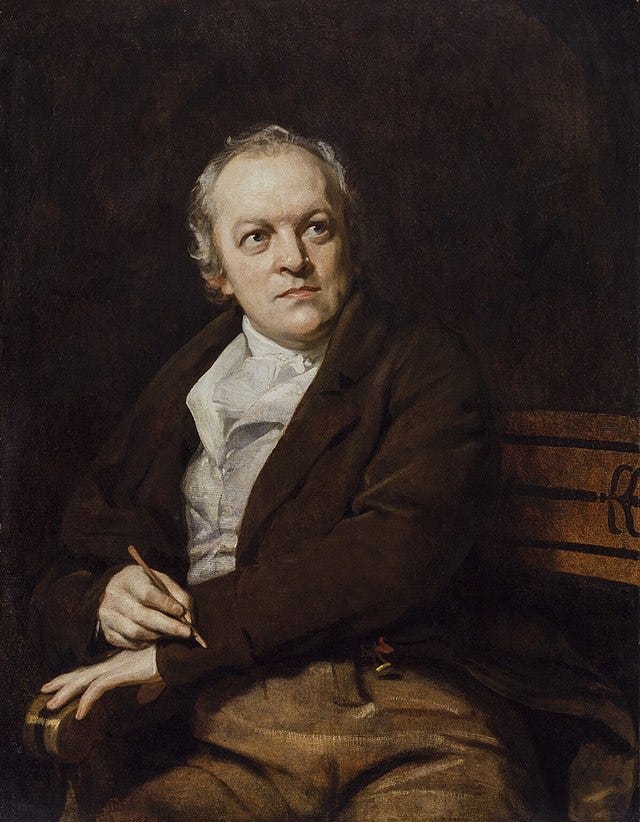[My favorite season of the year is upon us; the trees in my neighborhood have turned or are turning yellow or red or purple; the days are growing shorter, the dusks more prolonged; there are mists, rains, chilly winds; and everything feels mysterious and dreamlike. In celebration, I have rescued this piece from the back files. When I wrote it, we were still living on a forested mountain in a secluded cabin—a place I describe in Roland in Moonlight as our lost Eden.]
We rhapsodize about “New England Autumns,” and for good reason; but, really, Autumn anywhere in the deciduous forests of North America, especially in the East—from upper Canada to the deep South—is magnificent, and far outshines anything the Old World has to offer. In those years in which I have found myself in some corner of Europe during the Fall, I have never been able to suppress a certain feeling of disappointment at the limited palette nature employs there for what is surely my favorite of the seasons. This isn’t to say European Autumn is not lovely enough, with its muted light and drifting mists and pale flavescence. But the chromatic spectrum is narrow. For the most part, the trees pass from a darker to a more limpid green, and then to light gold, and then to ochre and brown, before their branches are stripped bare. There are occasional bright flashes of red and maroon amid the tawny pallor, though mostly from imported species of flora. But, to an eye accustomed to the endlessly varying hues of America’s Autumn, it can all seem a little insipid.
Perhaps it is only because I come from the east coast of North America that I think Fall the most poetical of months. Of course, every season is a season for poetry, and every season has been the subject of poetry; but I tend to think of this time of year as the most intrinsically poetic in nature. This may just be because of the contrasts in color: all that purple, crimson, scarlet, orange, cadmium, gold, and so forth, shifting and intermingling against a backdrop of luminous gray; it all seems like such a perfect coincidence of gaiety and melancholy, exuberance and death. Or perhaps it is because of a certain strange quality in the air that imbrues everything with an additional tincture of mystery: whole days washed in a kind of opaline twilight, the sun blanched to a cold silver by ubiquitous clouds, wood smoke floating through soft rains, and so on. Or perhaps it is simply because, as the temperature drops, one spends more time inside, ideally by a fire, and so has more time to devote to reading poetry.
Whatever the case, now that Fall is fully upon us, and I—in my forested retreat—can spend far more than my fair share of idle hours wandering about among the trees, I have begun making lists in my head of my favorite poems about Autumn. There is far too much to choose from, of course, for this to be a useful occupation, unless one is compiling one of those ephemeral anthologies that show up now and again, always already on sale, at Border’s or Barnes and Noble (which I am not). But it is an enjoyable pastime, and innocuous, and so I thought I might offer a brief extract here, and solicit additional suggestions.
In English, obviously, the autumnal poem is Keats’s “Ode to Autumn,” whose images, cadences, mood, and music seem more evocative of the season’s feel than any other lyric in the language. It is probably too well known to need quoting, but there is no harm in recalling at least the first stanza:
Season of mists and mellow fruitfulness, Close bosom-friend of the maturing sun; Conspiring with him how to load and bless With fruit the vines that round the thatch-eaves run; To bend with apples the mossed cottage-trees, And fill all fruit with ripeness to the core; To swell the gourd, and plump the hazel shells With a sweet kernel; to set budding more, And still more, later flowers for the bees, Until they think warm days will never cease, For Summer has o’er-brimmed their clammy cell
For all its archetypal supremacy, however, Keats’s poem is not necessarily any more distinguished than a great many others in the English canon. A case can be made that Thomas Hood’s “Autumn” is every bit as accomplished, and every bit as successful in conveying a sense of the dying year’s somber beauty. Again, the first stanza:
I saw old Autumn in the misty morn Stand shadowless like silence, listening To silence, for no lonely bird would sing Into his hollow ear from woods forlorn, Nor lowly hedge nor solitary thorn;— Shaking his languid locks all dewy bright With tangled gossamer that fell by night, Pearling his coronet of golden corn.
This is splendid, as are all the verses that follow. And Edward Thomas’s “October” is a quiet tour de force. To quote only its first lines:
The green elm with the one great bough of gold Lets leaves into the grass slip, one by one,— The short hill grass, the mushrooms small milk-white, Harebell and scabious and tormentil, That blackberry and gorse, in dew and sun, Bow down to...
Some of the finest Autumnal poetry in English, moreover, is the simplest. I have a certain tender regard for Walter Savage Landor’s “Autumn”:
Mild is the parting year, and sweet The odour of the falling spray; Life passes on more rudely fleet, And balmless is its closing day. I wait its close, I court its gloom, But mourn that never must there fall Or on my breast or on my tomb The tear that would have soothed it all
And growing up has done nothing to diminish my admiration for Robert Louis Stevenson’s “Autumn Fires”:
In the other gardens And all up the vale, From the autumn bonfires See the smoke trail! Pleasant summer over And all the summer flowers, The red fire blazes, The grey smoke towers. Sing a song of seasons! Something bright in all! Flowers in the summer, Fires in the fall!
That, as far as I am concerned, is pure genius.
When I turn to poetry in French, I have to admit, the pickings become slimmer—and I say this as a confirmed Francophile. In fact, for the most part French poetry is far poorer in nature verse than English poetry. Why this should be, given the beauty of the French landscape, it is hard to say. Perhaps it is because Romanticism arrived so late, and in such a decadent form, in France. The sheer severity of French classicism was often peculiarly inhospitable to any but the most urbane of themes. All the lovely, austere, exact Alexandrines of the French Golden Age stage taken together do not possess the power of four or five lines from “A Midsummer Night’s Dream” to summon up either the delicacies or the grandeurs of nature. And later French verse, to a greater degree than the English, remained largely a poetry of the city. These are generalizations, of course, susceptible of endless qualification.
But it seems to say something that two of the most famous French poems to mention Autumn in their titles—“Sonnet d’automne” and “Chant d’automne”, both by Baudelaire—have practically nothing to do with nature at all, and everything to do with the poet’s arrested emotional development. In the first, the actual season appears only in the closing lines: “Crime, horreur et folie! —Ô pâle Marguerite!/ Comme moi n’es-tu pas un soleil automnal,/ Ô ma si blanche, ô ma si froide Marguerite?” (“Crime, horror, and madness! —O, pale marguerite! Are you not, like me, an autumnal sun, O my Marguerite, so white, so cold?”). And the second uses Autumn as little more than a metaphor for every morose discontent and hysterical premonition the poet can wring out of his own pathologies: “Bientôt nous plongerons dans les froides ténèbres;/ Adieu, vive clarté de nos étés trop courts!/ J’entends déjà tomber avec des chocs funèbres/ Le bois retentissant sur le pavé des cours” (“Soon we shall plunge into the cold shadows; Farewell, delightful brightness of our too short summers! Already I hear the wood already falling, with a funereal shock, resounding over the courtyard pavement”). And the mood gets sicklier from there on.
Probably the best known French poem about Autumn, at least among English readers, is Verlaine’s “Chanson d’Automne”, which is so limpidly simple as to verge on the dainty, and whose gauzy effect no translation can really capture:
Les sanglots longs Des violons De l’automne Blessent mon cœur D’une langueur Monotone. Tout suffocant Et blême, quand Sonne l’heure. Je me souviens Des jours anciens, Et je pleure. Et je m’en vais Au vent mauvais Qui m’emporte De çà, de là, Pareil à la Feuille morte. (The long sobs of the violins of Autumn wound my heart with a monotonous languor.// Stifling everything, and wan, when the hour sounds, I recall the old days and I weep.// And I depart with the ill wind that carries me away, now here, now there, just like a dead leaf”)
This is lovely, in a tenuous, Gymnopédies sort of way, but somewhat lacking in the cider-soaked merriment of harvest time.
The specimens to be found in German seem, on the whole, to offer a somewhat richer range of feeling and color. Goethe’s “Herbstgefühl” (“Autumn Emotion”) strikes just the right balance between wistfulness and celebration:
Fetter grüne, du Laub, Am Rebengeländer Hier mein Fenster herauf! Gedrängter quellet, Zwillingsbeeren, und reifet Schneller und glänzend voller! Euch brütet der Mutter Sonne Scheideblick, euch umsäuselt Des holden Himmels Fruchtende Fülle; Euch kühlet des Mondes Freundlicher Zauberhauch, Und euch betauen, ach! Aus diesen Augen Der ewig belebenden Liebe Voll schwellende Tränen. (A fuller green, you leaves, up here to my window, along the grape trellis! Swell more crowdedly, indistinguishable berries, and ripen more quickly and more fully gleaming! On you broods the mother sun’s parting glance, all around you rustles the lovely sky’s fruitful abundance; you are cooled by the moon’s kindly and magical breath, you are bedewed—ah!—by the tears overflowing from these eyes of eternally enlivening love.)
I very much like Lenau’s “Herbst,” which has all the valedictory melancholy of Baudelaire’s poems, but without the morbidity. But it hardly evokes the season at all. And the same is true of Hölderlin’s “Der Herbst,” despite a lovely line about the ghost of rain appearing again in the sky.
Perhaps the most strangely affecting piece of autumnal verse in German is Rilke’s “Herbsttag,” “Autumn Day,” which fully displays his ability to infuse the ordinary with an indefinable quality of mystery:
Herr: es ist Zeit. Der Sommer war sehr groß. Leg deinen Schatten auf die Sonnenuhren, und auf den Fluren laß die Winde los. Befiehl den letzten Fruchten voll zu sein; gieb innen noch zwei südlichere Tage, dränge sie zur Vollendung hin und jage die letzte Süße in den schweren Wein. Wer jetzt kein Haus hat, baut sich keines mehr. Wer jetzt allein ist, wird es lange bleiben, wird wachen, lesen, lange Briefe schreiben und wird in den Alleen hin und her unruhig wandern, wenn die Blätter treiben. (Lord: it is time. The summer was too long. Lay your shadow across the sundials, and let loose the winds upon the meadows.// Bid the last fruits to be full; give them two more southerly days, urge them on to fullness and chase the final sweetness into the heavy wine.// Whoever has no house already will build none now. Whoever is now alone will long remain so, will waken, read, write long letters, and in the lanes will restlessly wander, here and there, while the leaves blow about.)
Anyway, only a very small selection to be sure. For what it’s worth, my favorite poem about Autumn, I think—and the one with which I shall close—is Blake’s “To Autumn”: a very early piece, practically a juvenilium, and largely devoid of the peculiar magic of his later, more hermetic verse. Of course, there is the characteristic transformation of its subject into an allegorical persona, which—along with a few other details—marks it as distinctively Blakean (but only just). As for why I would place it first in my affections, it is difficult to say. One never really knows why some poems affect one more than others of arguably equal or superior quality. The diction is a bit rough, even for Blake, and the scansion is somewhat thorny. But it captures something otherwise ineffable in the way the Fall feels to me, especially in its personification of the season as a figure who is essentially (in the most proper sense of the word) jovial.
O Autumn, Laden with fruit, and stain’d With the blood of the grape, pass not, but sit Beneath my shady roof; there thou may’st rest, And tune thy jolly voice to my fresh pipe, And all the daughters of the year shall dance! Sing now the lusty song of fruits and flowers. ‘The narrow bud opens her beauties to The sun, and love runs in her thrilling veins; Blossoms hang round the brows of Morning, and Flourish down the bright cheek of modest Eve, Till clust’ring Summer breaks forth into singing, And feather’d clouds strew flowers round her head. ‘The spirits of the air live in the smells Of fruit; and Joy, with pinions light, roves round The gardens, or sits singing in the trees.’ Thus sang the jolly Autumn as he sat, Then rose, girded himself, and o’er the bleak Hills fled from our sight; but left his golden load.











I am the Autumnal Sun
Sometimes a mortal feels in himself Nature
— not his Father but his Mother stirs
within him, and he becomes immortal with her
immortality. From time to time she claims
kindredship with us, and some globule
from her veins steals up into our own.
I am the autumnal sun,
With autumn gales my race is run;
When will the hazel put forth its flowers,
Or the grape ripen under my bowers?
When will the harvest or the hunter's moon
Turn my midnight into mid-noon?
I am all sere and yellow,
And to my core mellow.
The mast is dropping within my woods,
The winter is lurking within my moods,
And the rustling of the withered leaf
Is the constant music of my grief…
-Thoreau
This Dickens poem is in our kids’ poetry anthology and I love the end of the first stanza.
'Tis pleasant on a fine spring morn
To see the buds expand,
'Tis pleasant in the summer time
To see the fruitful land;
'Tis pleasant on a winter's night
To sit around the blaze,
But what are joys like these, my boys,
To merry autumn days!
We hail the merry Autumn days,
When leaves are turning red;
Because they're far more beautiful
Than anyone has said,
We hail the merry harvest time,
The gayest of the year;
The time of rich and bounteous crops,
Rejoicing and good cheer.